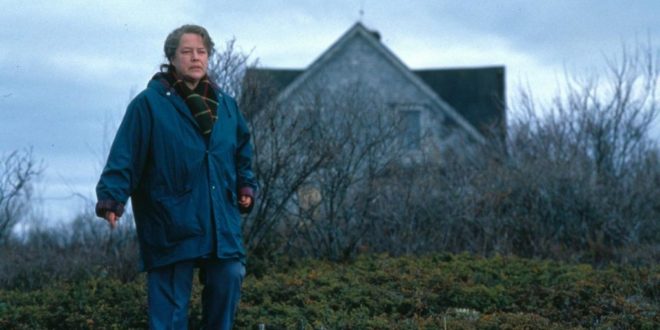On March 24, 1995, the Stephen King psychological thriller Dolores Claiborne was unleashed. Directed by Taylor Hackford, the film was fairly successful. Today, it’s considered among the best of Stephen King adaptations.
Frankly, this is a difficult film to categorize, or even discuss, as its central theme is abuse. Kathy Bates stars as Dolores Claiborne, a woman looking back and detailing many aspects of her experience with her abusive husband, Joe St. George (David Strathairn). What can be said about Joe? He’s not a good guy, and he’s not exactly conflicted about his bad behavior, either. Still, rather than focus solely on him, Dolores Claiborne focuses more on their daughter, Selena (Jennifer Jason Leigh/Ellen Muth), and her repressed memories. Can Dolores help her remember the disturbing past without leaving her completely damaged by trauma?
That’s not all, though. The film also focuses on Dolores’ complex relationship with her boss, Vera Donovan (Judy Parfitt). In the beginning, Vera is a wealthy heiress and cruel taskmaster to Dolores. However, a story of Joe’s abuse wins Vera’s sympathy, and Dolores becomes convinced to take matters into her own hands. While it’s far from a cheerful tale, it definitely seems like something that could happen.
To complicate things, however, Dolores ends up accused of murdering Vera by Detective John Mackey (Christopher Plummer), who has a special animus toward her which is rooted in his inability to convict her for, let’s just say, a separate yet similar case.

Has Dolores Claiborne Been Politicized?
When getting ready to discuss Dolores Claiborne, there was a bit of a nagging thought on my part: Trying to depict this story as some “feminist ode” (as some people have) doesn’t feel right. Yes, this story has mostly male antagonists, and there’s no mistaking that. However, there’s also no denying that abuse itself is more of the focus, no matter who’s committing it. Yes, Joe is a bad guy, but by no means does the story attempt to pit men against women or anything so dramatic as that. In fact, Dolores finds her freedom largely from within, and it’s certainly a mixed freedom that is difficult to categorize. It’s not just out of reaction to her rotten situation, either. It’s something she’s had all along but could never truly grasp until getting Selena back in her life.
It should also be said: Vera Donovan is not that great of a person either, to say the least. However, Dolores comes to care for her due to her boss’ interest in Selena’s well-being, as well as her growing dependence on Dolores’ care in her advancing years. In key ways, Vera is also abusive, and so is Dolores, in fact… and even Selena. Joe just happens to be the most obvious abuser and ends up paying for it. In other words, Dolores Claiborne is not just some boys vs. girls polemic. It deserves more credit than that, much like Patty Jenkin’s Monster.
Part of what makes Dolores Claiborne a psychological thriller is Selena’s need to bury the past. This movie is well-known for its disturbing scenes related to her realizations. How powerful are these moments? They’re definitely enough to make a person wince. We don’t quite know what makes Joe so awful, but he was obviously not right in the head in some way. In fact, it seems there’s no way around his ultimate fate… as if it’s his destiny. While there are humorous moments between Joe and Dolores, his moodiness always ends up taking over, and he seems hellbent for destruction, one way or the other. It seems like that could be Selena’s fate until she actually faces the truth.
What do you think of Dolores Claiborne? Let us know in the comments!
 PopHorror Let's Get Scared
PopHorror Let's Get Scared




